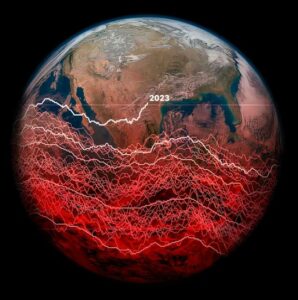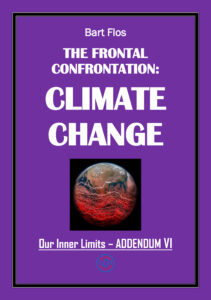 In 2015 I published my fifth book, Vooruitkijken voor gevorderden – Hoop voor de toekomst van mensaap en moederplaneet (‘Futurology for Fanatics – Hope for the Future of Man Ape and Mother Planet’). It is an easy to read book with the same design as its predecessor De kenniskermis – Overleven in een zee van informatie (‘The Knowledge Fair – How to survive in a sea of information’). Short chapters of approximately 800 words, provided with QR codes and TED(x) talks, nice pictures and numerous references to other interesting books.
In 2015 I published my fifth book, Vooruitkijken voor gevorderden – Hoop voor de toekomst van mensaap en moederplaneet (‘Futurology for Fanatics – Hope for the Future of Man Ape and Mother Planet’). It is an easy to read book with the same design as its predecessor De kenniskermis – Overleven in een zee van informatie (‘The Knowledge Fair – How to survive in a sea of information’). Short chapters of approximately 800 words, provided with QR codes and TED(x) talks, nice pictures and numerous references to other interesting books.
In Futurology for Fanatics, I not only discuss humanity’s major problems, but I also provide hopeful solutions. By (daring to) look ahead 100, 1000 and even 10,000 years, I paint a picture of the limitless possibilities that Homo sapiens has to shape its own future. The final goal? Preserving our planet to prepare it as a home base for the exploration of the cosmos.
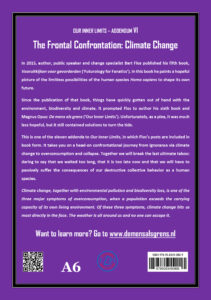 I still remember someone calling me a ‘naive idealist’ then. I defended this fiercely at the time and replied that I preferred to call myself an ‘incorrigible optimist’. “Yeah, yeah,” was the response, “Dream on.” But it really wás true, I wás sitting on a comfortable pink cloud and I wás looking through rose-colored glasses, which turned out to be a cold, metal telephoto lens and microscope. It wasn’t until I got into my helicopter, flew as high as I could and started looking down that the scales fell from my eyes.
I still remember someone calling me a ‘naive idealist’ then. I defended this fiercely at the time and replied that I preferred to call myself an ‘incorrigible optimist’. “Yeah, yeah,” was the response, “Dream on.” But it really wás true, I wás sitting on a comfortable pink cloud and I wás looking through rose-colored glasses, which turned out to be a cold, metal telephoto lens and microscope. It wasn’t until I got into my helicopter, flew as high as I could and started looking down that the scales fell from my eyes.
Fast forward to 2022
Since the publication of Futurology for Fanatics more than half a billion people have been added to the population, we have emitted another 285 gigatons of CO2 and the CO2 level in the atmosphere has risen from 400 to 418 ppm. And that has categorically transformed me from an incorrigible optimist to a ‘confrontealist’, someone who confronts those around him head-on with hard science, with observation, research, facts and evidence.
Intensive and deep research over the past two years has led me to write my sixth book, my Magnus Opus, which brings together all my previous work. De mens als grens – Over de onbuigzame barrières van ons bestaan (‘Our Inner Limits – On the Unbending Barriers of Being’) is much less hopeful as a plea, unfortunately, but it still contains solutions. These are now the last solutions we have left.
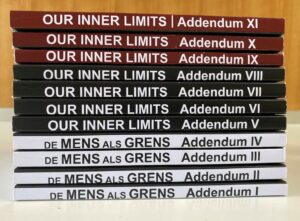 I’m sorry that this time I don’t share hopeful dreams about the human species, which first preserves its planet and then seeks refuge among the stars. But it is time that we recognize, acknowledge and confess what we are: social group primates and hunter-gatherers, who are extremely proficient at surviving and reproducing. At the expense of everything and everyone. It’s the nature of the beast.
I’m sorry that this time I don’t share hopeful dreams about the human species, which first preserves its planet and then seeks refuge among the stars. But it is time that we recognize, acknowledge and confess what we are: social group primates and hunter-gatherers, who are extremely proficient at surviving and reproducing. At the expense of everything and everyone. It’s the nature of the beast.
Fast forward to 2024
When I delivered the final manuscript of Our Inner Limits to my publisher in October 2022, I could not have imagined how quickly things would get so much worse. The year 2023 is the year that we passed the ‘elbow’ of the exponential curve. This means that from then on, events affecting the environment, biodiversity and climate will no longer follow a relatively linear path, but a chaotic, completely unpredictable one.
Since the publication of my sixth book, I have written a thousand 500-word posts on LinkedIn, about 60 per month, 2 per day, every day. In order not to let them go to waste in the endless timelines, I have included them in eleven addenda to Our Inner Limits: four in Dutch and four in English. In these addenda I’m taking you on that accelerating path of decline as we embark on a journey from ignorance to climate change to overconsumption and collapse.
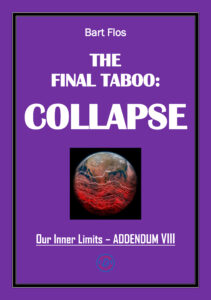 I would have liked to tell you something different, but it’s not 2015 anymore. It is no longer 1970 either, when we could still dó something. Or 1990, pretty much humanity’s last chance to avoid collapse. I was forced to give up the ‘hopeful future of man ape and mother planet’. In turn, I hope you’ll stick with it to work your way through the addenda, because it’s a story that needs to be told. Science, truth and reality now tell us that we have actually waited too long. It is too late. Collapse is now locked into the system.
I would have liked to tell you something different, but it’s not 2015 anymore. It is no longer 1970 either, when we could still dó something. Or 1990, pretty much humanity’s last chance to avoid collapse. I was forced to give up the ‘hopeful future of man ape and mother planet’. In turn, I hope you’ll stick with it to work your way through the addenda, because it’s a story that needs to be told. Science, truth and reality now tell us that we have actually waited too long. It is too late. Collapse is now locked into the system.
With these eleven addenda, I hope to arm you not only with facts and evidence and the latest insights from the scientific community. I especially hope that it will make you and your loved ones more resilient to what is coming. Because our future is no longer a few hundred years away, or in the next century, or at the end of this century, or in 2070 or 2050. Our future takes place in the next ten years.
To conclude, I don’t think it would be prudent to wish you ‘much reading pleasure’. I wish you lots of wisdom and strength instead.
